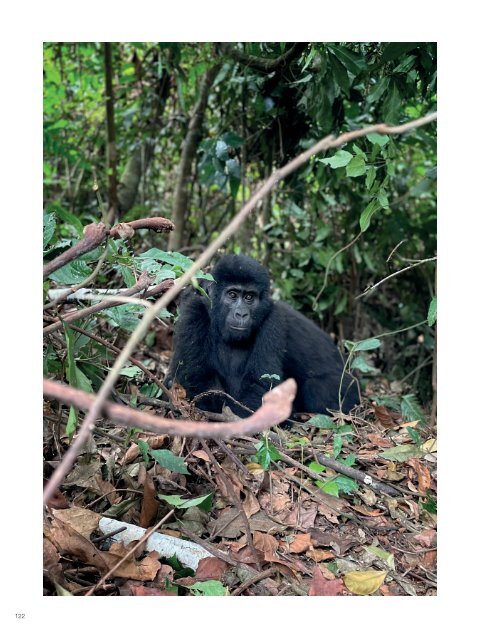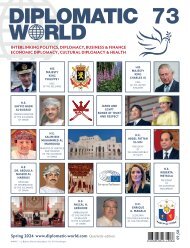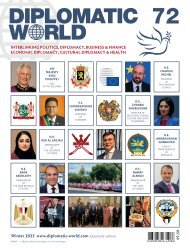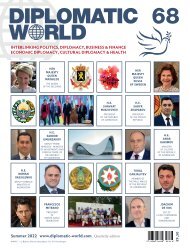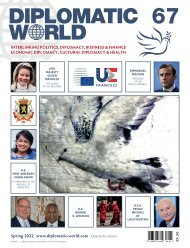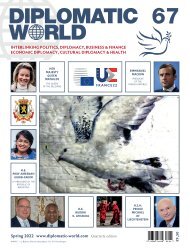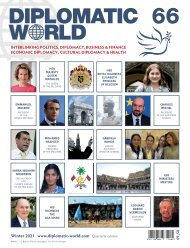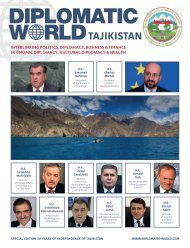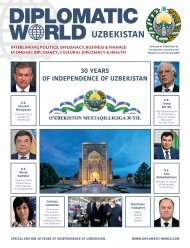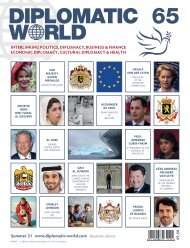Diplomatic World_69
You also want an ePaper? Increase the reach of your titles
YUMPU automatically turns print PDFs into web optimized ePapers that Google loves.
a rare moment of joy. I ignored that every tourist in this region<br />
wanted the same. It is my water pilgrimage to Uganda, the bird<br />
paradise.<br />
The next day, a young gorilla stumbled upon our excited party.<br />
After a gruelling, hours-long trek through part of the Bwindi<br />
Impenetrable Forest National Park, we stood again in wonder.<br />
Half of the world’s remaining mountain gorillas live in this<br />
Ugandan park. We had all seen it on tv and read about it in<br />
magazines. The clichés are indeed correct: the forest is dark,<br />
impenetrable, and extremely talkative, and the gorillas are gentle<br />
giants. We, carriers of lethal viruses, were asked to keep some<br />
distance and to never look them in the eyes. For them, we should<br />
be a floating hallucination, not a nightmare. We were promised<br />
that maybe a silverback would honour us with his presence, but<br />
he never materialized.<br />
We decided to return from the wild to the domesticated world<br />
before dark hit us. On the way back to the jeep, only the shoebill<br />
stork kept running through my mind. The gorilla is a mirror, the<br />
Shoebill a guide. It is a bird of the past and the future. While the<br />
gorilla, moving freely within the reserve’s boundaries, reflects our<br />
limitations, the shoebill has a different kind of freedom. One that<br />
allows him to fly into the future. As an excruciating pain in my<br />
shoulders and knee chased me off the volcano’s slopes, I could<br />
not help but wonder about something I had briefly heard before –<br />
something about pygmies.<br />
There is no light without darkness. No conservation without<br />
destruction. It is undoubtedly true that ecotourism in Uganda<br />
works wonders for the gorillas, but it also has a dark side. A<br />
side our ranger failed to mention. Just before we went to Bwindi,<br />
I had heard that decades ago, the original forest dwellers,<br />
pygmies called Echuya Batwa, were driven out of the forests<br />
to ‘protect’ the gorillas. Severely impoverished and discriminated<br />
against, the number of these hunter-gatherers steadily<br />
decreased. Their ancient, sustainable way of life had been<br />
considered obstructive to the forest conservation. The Batwa<br />
were forced to live outside of their millennial homes, and they<br />
were utterly unprepared. While the world revels in the successful<br />
conservation of mountain gorillas, the Batwa are heading for<br />
extinction. The multi-million dollar gorilla tourism has cast them<br />
into abject poverty and delivered them to the mercy of Christian<br />
charity.<br />
I wondered about this. About balance. About duality. About<br />
survival. About human rights. About nature’s rights.<br />
The natural wealth of Uganda contrasts sharply with the poverty<br />
of its people. In Entebbe, we made plans to set up an integral<br />
experiment with ViaVia Entebbe, one of the Joker Travel cafes.<br />
After all, that is why we had travelled to Uganda. To discover, to<br />
listen, to learn, to understand. To help and to be helped. To use<br />
one of my giant Cosmogolem statues to let the minds of young<br />
people discover and develop their own identity. To introduce sustainable<br />
chickens on Open Farms. To empower women through<br />
the cultivation of mushrooms. All of us present there decided to<br />
combine our efforts. We were inspired by the power of gorillas<br />
and the perspective of a shoebill stork. Collectively we believe<br />
in the future of hope. For the birds, the mammals, and all human<br />
animals, also the Batwa.<br />
Photos: Rudi Veestraeten, Amos Ategeka & Koen Vanmechelen<br />
122 123


